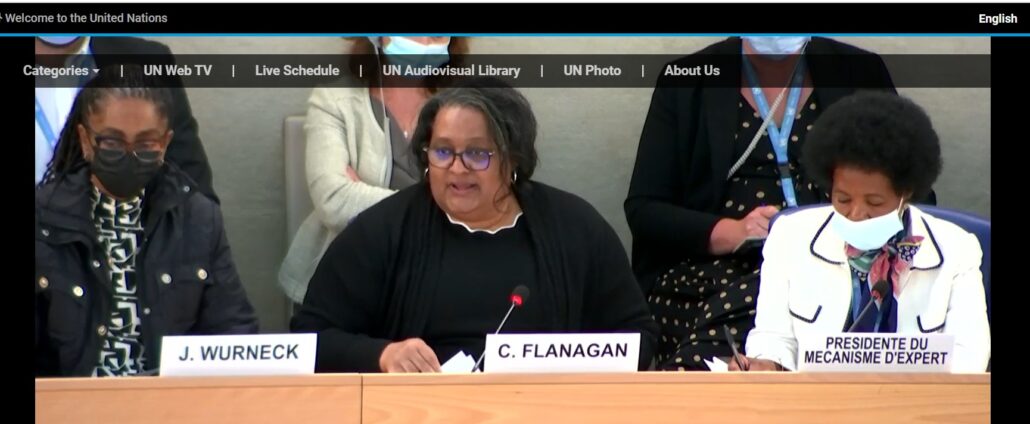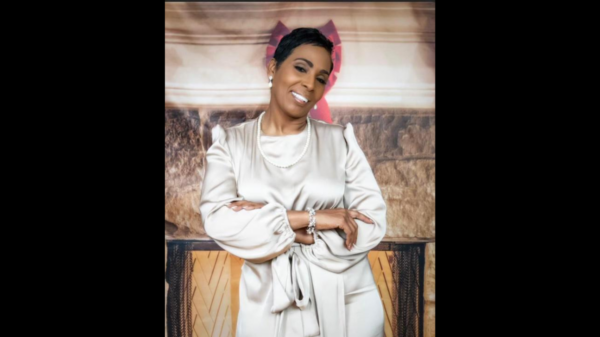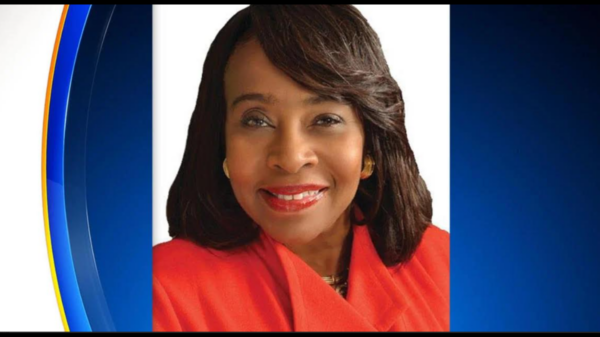Collette Flanagan, Founder, Mothers Against Police Brutality Remarks before the United Nations Human Rights Council October 3, 2022

I’d like to thank President Villegas and the Human Rights Council for inviting me here today.
I founded Mothers Against Police Brutality because a police officer in Dallas, Texas, killed my son, my only son, Clinton Allen. A 25-year-old Black father of twin infant boys, Clinton was unarmed that night in March 2013, when a Dallas officer shot him seven times – five times in the chest, once in his raised left arm, and once in the back at close range.
Clinton’s killing contained almost every dimension of the current crisis in policing in the United States. My son was Black, and a Black person is 2.5 times more likely to be shot to death by police.
My son was unarmed, yet he was perceived by a fully armed White officer as a lethal threat. This officer escaped all criminal and civil accountability for killing my son – no charges, no indictment, no trial, damages.
Clinton was one of the thousand people shot to death every year by United States police. Our family’s grief and struggle are part of an ongoing national crisis. Police in the United States fatally shot more than 7,000 people in the years 2015-2021. Of the roughly thousand cases annually of people shot to death by police officers in America, on average less than 1% result in an indictment; even fewer cases produce a conviction at trial.
If we are to elevate human rights in policing, we will have to address three challenges: the use of deadly force; the judicial doctrine of qualified immunity; and the treatment of families and communities suffering from racial profiling, police brutality, and extrajudicial killings.
Two Supreme Court decisions, in 1985 and 1989, govern deadly force policy in the United States. The court has ruled that deadly force can only be used when “the officer has probable cause to believe that the subject poses a significant threat of death . . . to the officer or others” and that a specific use of force must be evaluated by what a “reasonable officer” would do. In these two rulings, the court has granted officers almost universal impunity – even when they shoot an unarmed person, like my son Clinton, in the back.
We cannot continue to justify the use of deadly force on an officer’s perception of a threat. Officers who routinely “shout and shoot” at a suspect will always claim they “feared for their life.” Many lives could be saved if the use of deadly force were based not on an officer’s perceptions, but on the actual observable conditions at the scene. For example, police officers could be prohibited by law from using deadly force when they encounter a person who is unarmed, having a mental health crisis, running or driving away, sitting in a parked vehicle.
If “I feared for my life” is a shield against criminal prosecution, then qualified immunity is an officer’s armor in civil court. Qualified immunity is an affirmative defense used by officers in wrongful death cases to keep from paying damages.
We must take care of families that experience injury and death at the hands of police. We must make them whole. We must confront the vast unmet human needs in communities suffering from lack of opportunity, poverty, and racism – communities that remain “high crime” areas despite decades of aggressive policing. This well documented paradox argues not only for fundamental changes in policing, but also for increased public investment to change the social conditions associated with criminal activity.
To end extrajudicial killings, we must go deeper within our struggling communities to organize a more sustained resistance. Mothers Against Police Brutality is building a national network of leaders among directly-impacted families who have the staying power to actually deliver the necessary changes. Through our Fellowship Legacy Program, now operating in ten cities, directly impacted mothers are gaining skills and experiences that will help them to become leaders in a broader national movement to change policing.
The police forces of this world are almost a world power in themselves. But those of us who work to bring justice and human rights into law enforcement are a power as well. And I have no doubt that the collective power of conscience against injustice will have, as America’s greatest theologian once said, “the final word in reality.”









You must be logged in to post a comment Login